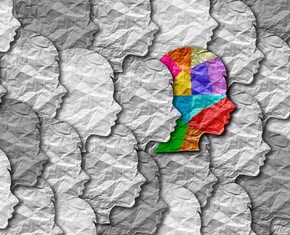The views expressed in our content reflect individual perspectives and do not represent the authoritative views of the Baha'i Faith.
Wanting, buying, having and then discarding things – has that become the way of the world we now live in?
Just as fast as goods leave the factories, other goods get dumped into landfills. That cycle affects us all.
Consumerism provides the driving force behind technology and the world economy – and the cause of the environmental crisis that looms over us. For that reason, visionaries like Jeremy Rifkin have called for a new economy, a new way of life that transcends consumerism.
In the 19th Century, Baha’u’llah saw the destructive nature of unbridled materialism:
Consider the peoples of the West. Witness how, in their pursuit of that which is vain and trivial, they have sacrificed, and are still sacrificing, countless lives for the sake of its establishment and promotion. – Gleanings From the Writings of Baha’u’llah, p. 196.
Due to the Industrial Revolution of the 19th and early 20th centuries, Western countries developed economically at a rapid rate, with more and more industrial output and novel inventions each year. Looking back, life then seems incredibly under-developed. Yet, Baha’u’llah could see the underlying dangers of our obsession with ownership of places and things.
Have things changed? On the surface things seem much better now, especially from the privileged vantage point of a new high-rise apartment in a developed country. However, huge differences still exist between the rich and poor in the world; the poor are still exploited for their cheap labor while the rich reap the benefits. Not only that, because of the environmental crisis we face, with the Earth’s temperature and sea levels rising, many people in future generations in developing countries will be sacrificed due to our consumer activities right now.
Yet we continue consuming, even though most of us know that our obsession with material things will not bring us happiness. Why? Because it is not our purpose in life to have more and more things. As the Baha’i teachings say: “Man’s merit lieth in service and virtue and not in the pageantry of wealth and riches.” – Tablets of Baha’u’llah, p. 138.
The Baha’i Faith, and all true religions, describe our purpose in life as worshipping God, and doing so through love, by mirroring His virtues and serving others. When we serve God’s servants, we serve Him, and we find our true purpose. This is where our meaning and fulfilment lies. This is what will lead us to true happiness.
On the other hand, the exclusive pursuit of our own pleasures only ends in sorrow. So, does this mean we should all shed our belongings and live a life of deprivation and poverty? No, the Baha’i teachings say. Having things is not wrong in and of itself. When they come between us and God, that is the problem. As Baha’u’llah explained:
Know ye that by “the world” is meant your unawareness of Him Who is your Maker, and your absorption in aught else but Him … Whatsoever deterreth you, in this Day, from loving God is nothing but the world. Flee it, that ye may be numbered with the blest. – Gleanings From the Writings of Baha’u’llah, p. 276.
Pleasures and possessions are not the problem – the problem is our attachment to them. When we’re too attached to owning things, we hold on to them so tightly that we loosen our grasp from the most important thing: our own souls. So, how do we ensure that material things do not get in between us and God? Baha’u’llah wrote:
The best of men are they that earn a livelihood by their calling and spend upon themselves and upon their kindred for the love of God, the Lord of all worlds. – The Hidden Words, p. 51.
We can transcend our attachment to material things by loving God and serving others. Doing things for the love of God creates balance in our lives. When we devote all of our actions to our own selfish desires, our lives become lopsided and destructive. The opposite of what we want actually ends up happening. We want to be happy, so we accrue more and more wealth and indulge in more and more meaningless pleasures, but what ends up happening? We’re left feeling miserable because our souls starve when they don’t receive their real food – the love of God. To truly be happy, we need to live a life devoted to something higher than ourselves.
So how do we express our love for God, when we can’t know or understand our Creator? We can live a life devoted to others – to God’s light shining in others. Walking this path leads to true, lasting happiness. We can smell the roses along the way – we can enjoy delicious food, enjoyable pastimes, beautiful places, but we shouldn’t get side-tracked by these things. These things shouldn’t lead us off the path toward God.
Interestingly, it seems that if we live such a life, our life will naturally become more balanced, not solely focused on having more and more things. We will no longer live a life devoted to consumerism. Hence, we will dramatically reduce our destructive impact on the Earth, because we will all have a much smaller carbon-footprint and fewer materialistic goals:
It is indeed a good and praiseworthy thing to progress materially, but in so doing, let us not neglect the more important spiritual progress, and close our eyes to the Divine light shining in our midst. – Abdu’l-Baha, Paris Talks, p. 63.
















Comments
Sign in or create an account
Continue with Googleor